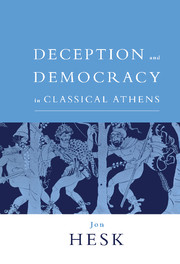Book contents
- Frontmatter
- Contents
- Preface
- Prologue
- 1 Deception and the rhetoric of Athenian identity
- 2 Deceiving the enemy: negotiation and anxiety
- 3 Athens and the ‘noble lie’
- 4 The rhetoric of anti-rhetoric: Athenian oratory
- 5 Thinking with the rhetoric of anti-rhetoric
- Epilogue
- Bibliography
- Index locorum
- General index
1 - Deception and the rhetoric of Athenian identity
Published online by Cambridge University Press: 22 September 2009
- Frontmatter
- Contents
- Preface
- Prologue
- 1 Deception and the rhetoric of Athenian identity
- 2 Deceiving the enemy: negotiation and anxiety
- 3 Athens and the ‘noble lie’
- 4 The rhetoric of anti-rhetoric: Athenian oratory
- 5 Thinking with the rhetoric of anti-rhetoric
- Epilogue
- Bibliography
- Index locorum
- General index
Summary
British statesmen and public men have never at any time used mendacity as an instrument of war, still less have they uttered such praises of lying as Hitler has done in Mein Kampf … In Great Britain we believe in the ultimate power Truth.
Viscount Maugham, formerly the British Lord Chancellor, wrote these (partly mendacious) words in a pamphlet published in 1941 entitled Lies as allies: or Hitler at war. Hitler was happy to declare the usefulnes of deception as a means of achieving his ends and despite the availability of Mein Kampf in Britain at the time, Neville Chamberlain had believed the dictator's guarantees of peace in 1938. It makes sense to us now that an establishment pamphleteer would want to represent Hitler's ‘praises of lying’ as anathema to ’Britishness’ and propagate the falsehood that, in contrast to Hitler, British statesmen had never used mendacity as an instrument of war. But Maugham's propaganda, whilst unsurprising, underscores some important points which I will be making in this chapter. Firstly, Maugham mobilises the ideology of ‘national character’ in his argument. Regardless of the realities of British military and political history, he is able to represent Great Britain as a nation committed to ‘Truth’. Secondly, Maugham's contrast between Hitler and ‘Britishness’ draws its persuasive force from a premise that was essentially true from a British point of view: Hitler had praised lying in his writings and he had proved himself a liar on the international stage.
Information
- Type
- Chapter
- Information
- Deception and Democracy in Classical Athens , pp. 20 - 84Publisher: Cambridge University PressPrint publication year: 2000
